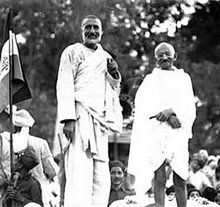Sunday, May 13, 2012
satyagraha/i'tisaam
It is often mistakenly assumed that Mahatma Gandhi's notion of satyagraha is indigenous to Hinduism. It is not. Gandhiji was a disciple and interpreter of Leo Tolstoy; instead of deriving his commitment to non-violence from his inherited religious tradition, the Mahatma attempted to introduce the Tolstoyan doctrine into Hinduism by "domesticating" it with a newly coined Sanskrit term.
According to Gandhi, "satyagraha is literally holding on to Truth and it means, therefore, Truth-force. Truth is soul or spirit. It is, therefore, known as soul-force. It excludes the use of violence because man is not capable of knowing the absolute truth and, therefore, not competent to punish [--this is a variation on a Tolstoyan argument]. The word was coined in South Africa to distinguish the non-violent resistance of the Indians of South Africa from the contemporary 'passive resistance' of the suffragettes and others. It is not conceived as a weapon of the weak" [M. K. Gandhi, Non-Violent Resistance (Satyagraha), Mineola, NY: Dover Publications, Inc. (2001), 3].
This explanation is quite interesting because it calls to mind a famous passage from the Qur'an that Gandhi may well have had in mind when he coined the term. It must be recalled that many of the South Asians living and working in South Africa and subject to the voting rights curb enacted into law by the Natal Legislative Assembly were Muslim.
The Qur'anic passage that the term "satyagraha" calls to mind is this:
Hold tight the rope of God and be united; do not split up into factions but recall the blessings of God upon you. When you were enemies, God bound your hearts together and you became brothers by His grace. You were poised on the edge of the pit of Hell but God drew you back from it. Thus did He make clear to you his Signs; so perhaps you may be guided [Q. 3: 103, my translation].
The Arabic imperative in the passage that translates as "hold tight" comes from the triliteral root '/s/m. This root has come down to modern standard Arabic with a variety of meanings: to hold back, restrain, curb, check, prevent, hinder; preserve, guard, safeguard, defend. The particular form that the Qur'an employs in this instance is VIII, which has the sense of clinging onto something (such as, in verse 103, "the rope of God"). It also retains the sense of taking shelter or refuge, to guard or preserve and, in modern usage, may signify the occupation of a building as occurs in a work stoppage or sit-in strike--important "weapons" in the Gandhian arsenal. It may also be used in the sense of resisting temptation.
The Qur'anic i'tisaam therefore conveys a sense of strenuous effort as opposed to the passivity that Gandhi wished to avoid when he coined satyagraha and attempted to persuade his Muslim admirers to adopt it. It also imports the sense of a united front against oppression and the conversion of enemies into friends.
i'tisaam is therefore a cardinal Tolstoyan principle of the ascetic lovers of humankind who embrace the Islamic vision of Nizami Ganjavi: the Majnuniyya.
Subscribe to:
Post Comments (Atom)





No comments:
Post a Comment